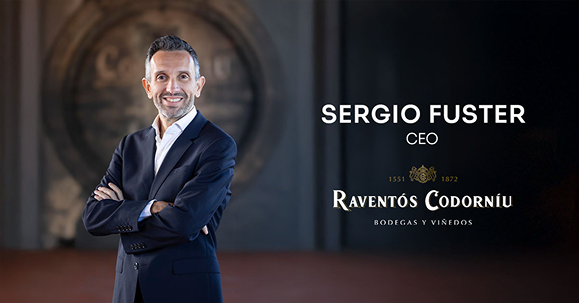Sergio Fuster, CEO of Raventós Codorniu, emphasizes how sustainability has become deeply embedded in Raventós Codorníu’s strategy—driving innovation, responsible growth, and long-term value creation. His words reflect a vision where environmental stewardship, social responsibility, and business success go hand in hand.
Yes, at Raventós Codorníu, sustainability is fully integrated into our management model. In fact, sustainability lies at the very core of our business and serves as a fundamental pillar of our corporate strategy, guiding all our actions and decisions toward responsible development.
As proof of our commitment, the company has been certified as a B Corp, confirming that we do not pursue purely economic goals but instead meet high standards of social and environmental performance, public transparency, and legal accountability. This approach is fully aligned with Raventós Codorníu’s roadmap, whose production of Codorníu cava has been 100% organic since 2023, and whose corporate purpose—“Giving value to the land”—reflects our dedication to caring for both the environment and the people who make up our company.
We believe that sustainability is not only an obligation but also an opportunity to innovate, improve processes, and create long-term value. We have a cross-cutting ESG (environmental, social, and governance) strategy that spans all areas of the company—from viticulture to efficient management of water, energy, and waste, as well as the well-being of our employees and the communities around us.
“Codorníu cava production has been 100% organic since 2023..”
Currently, sustainability plays a transversal role in the decision-making processes of the Board of Directors. We have a Sustainability Committee within our governance structure that reports regularly to the Board. This committee, led by the Global Strategic Communications Department and co-led by executives from across the group, is responsible for setting objectives, monitoring key indicators, and ensuring that strategic decisions remain aligned with our environmental and social commitments.
The main challenge for this area is to advance toward a more transversal and approachable model of corporate reputation management—one that helps us convey Raventós Codorníu’s culture in a fully integrated way.
The ultimate goal of this committee is to promote commitment in the group’s management through three main pillars: Economic (prosperity), Social (people), and Environmental (planet).
Absolutely. Sustainability is already a fundamental pillar of our present and future vision. We are witnessing how consumers, regulations, and the business environment as a whole are moving toward a more conscious and responsible model.
In our sector, this translates into producing wines and cavas in a more environmentally friendly way, protecting the biodiversity of our vineyards, and ensuring agricultural practices that improve soil health and reduce the carbon footprint. Moreover, sustainability is key for any business that seeks to grow responsibly—placing people at the center and creating opportunities that attract and retain talent.
“Sustainability is key for any business that aims to grow responsibly..”
In the specific case of Raventós Codorníu, in 2022 we entered a new phase of acceleration toward sustainable growth, and this commitment—which we have been gradually strengthening—will become even more visible in the coming years.
Among our main challenges are adapting our vineyards to climate change; managing resources efficiently, with a particular focus on water management; conserving biodiversity; promoting a circular economy; and, of course, caring for our vineyards, winegrowers, and the people who make this project possible every day.
Effectively addressing these challenges will allow our company to continue leading in sustainability and creating long-term value.
Regulation is moving in the right direction, especially with initiatives such as the Corporate Sustainability Reporting Directive (CSRD) at the European level. However, there are still significant challenges: the standardization of criteria, the administrative burden, and the lack of clarity in certain reporting standards.
Ideally, regulation should be simplified across countries and include real incentives for companies that are leading the sustainable transition. It is essential that legislation evolves toward a more effective model—one that prevents greenwashing and promotes environmental and social transition in a measurable and credible way.
“Regulation should be simplified across countries and include real incentives for companies.”
At our company, we highly value this type of certification for events or venues, as it provides transparency, credibility, and a clear commitment to addressing the environmental and social impact of the events sector.
In our case, as a winery group with enotourism spaces and events, we actively work to ensure that our facilities meet certified sustainability standards. This not only strengthens our brand but also responds to a growing demand from clients who seek responsible experiences aligned with their values.
We thank Sergio Fuster, CEO of Raventós Codorniu, for sharing his vision and experience.
Sergio Fuster, CEO of Raventós Codorniu, emphasizes how sustainability has become deeply embedded in Raventós Codorníu’s strategy—driving innovation, responsible growth, and long-term value creation. His words reflect a vision where environmental stewardship, social responsibility, and business success go hand in hand.
